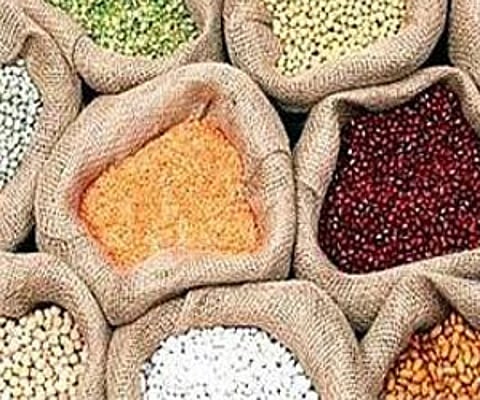

BENGALURU: Multiple factors are at play in pushing inflationary trends that are in turn causing prices of commonly consumed tur and urad dal to rise upwards, much to the misery of the common man. Worse, these trends are set to continue due to the prevailing inflationary trends in the days to come.
The price of tur dal has increased by about Rs 15-20 per kilogram. In the retail, it was selling at Rs 150-170 kg for the packed variant which attracts 5 per cent GST, while the loose variant was selling at Rs 135-145 per kg which does not attract GST.
Wholesale market prices were about Rs 120 per kg. This price hike has been gradual over the past three weeks and was capped after the GST was hiked. Urad dal has been soaring since it was imported and was selling in retail for about Rs 160 per kg and wholesale at about Rs 130 per kg also similarly over the past about three weeks.
Compounding this, power tariffs have gone up and monthly bills on an average in most middle-class households have increased by about Rs 200 per month. The price of rice, which is the staple diet of people of the state has increased by about 8-10 per cent thanks to a variety of reasons, including 5 per cent GST on packed rice, while steamed rice which is used by commercial eateries has been about 8-10 per cent higher.
‘Falling rupee increased price of import items’
Economist, Professor Govind Rao, former member of the National Finance Commission, said, “The prices of petroleum products have been high, this affects transportation of all commodities including food items like Tur Dal and edible oils. The falling rupee against the dollar has meant imported items like Urad Dal are more expensive. The inflation which started on the supply side has spread to the demand side.’’
Professor Shankarshan Basu, economist, said, “We are buying oil from Russia which is cheaper and which is not being passed on to the customers. If prices of fuel are high the transportation costs hit the overall economy. The basic staple foods like tur, urad etc are witnessing an inflationary trend because of transport prices. Add to this the dollar is strengthening against the rupee and import bill is going up, which is causing all the problem.’’
Asked about the increase in price of Tur Dal and food grains, Ramesh Lahoti, foodgrain trader at APMC, said market forces and a variety of reasons have ensured the prices are high. While prices of food grain and essentials remain high, many political leaders suggest that the government has to resort to some remedial measures to deal with this, failing which people will continue to suffer.
Price rise is not something that will end today but will continue to simmer for sometime, Nitul J Shah a trader at APMC Bangalore told TNIE. He said rains have affected many standing crops like onions and potatoes which are grown, besides there have been complaints that some portion of the standing crops have been affected due to heavy rains and this is expected to hit the prices of these two crops when they hit the market in about 3-4 weeks from now.